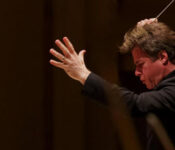Commentary: Conductors hardly ever address their listeners. While they may press hands to heart or wave goodnight, they seldom speak. But after leading the Chicago Symphony Orchestra in a stupendous performance of Shostakovich’s Symphony No. 11 on March 22, Czech conductor Jakub Hrůša raised his hands to quiet a roaring audience at Orchestra Hall. He had something to say that mattered to him.
Read the full story »‘Flying Dutchman’ at Lyric Opera: A dark tale made brilliant by the voices of a doomed pair
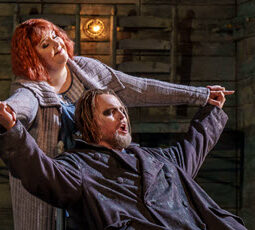
Review: The sorry plight of Wagner’s Senta, the lass who obsesses about the accursed sea captain in “The Flying Dutchman,” always puts me in mind of Schubert’s plaintive Gretchen at the spinning wheel, bereft of peace and heavy of heart. “Dutchman” is one dark opera, populated by distraught or deeply neurotic characters for whom there is no relief and never will be. Still, there is a certain radiance to the bleakness and it suffuses a compelling account of Wagner’s music-drama at Lyric Opera of Chicago.
Muti is CSO Music Director Emeritus for Life; honor caps grand Beethoven Missa Solemnis
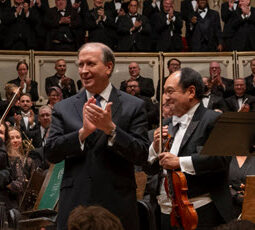
Review: The Chicago Symphony Orchestra and its music director for the last 13 seasons have come to a conclusion and a consummation of that long and distinguished relationship, but not an ending. After a sublime account of Beethoven’s monumental Missa Solemnis with the CSO and Chorus at Orchestra Hall on June 23, Riccardo Muti was invested as Music Director Emeritus for Life in a presentation by Jeff Alexander, president of the Chicago Symphony Orchestra Association and Mary Louise Gorno, chair of the board of directors.
With CSO’s grand Beethoven finish still ahead, Muti stamped directorship with great Schubert
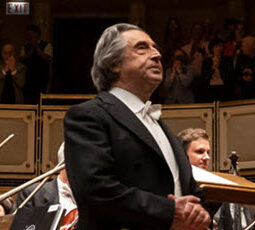
Commentrary: It has been like a double bill, or a fascinating theater piece with a twin ending, Riccardo Muti’s transition from his music directorship of the Chicago Symphony Orchestra. In any other season, the CSO concerts June 15-17 would have made a terrific finale – a delightful tuba concerto spotlighting CSO principal Gene Pokorny, with plenty of schtick thrown in, and a great performance, indeed, of Schubert’s “Great” C major Symphony. But this is not just any season, and its actual consummation with Beethoven’s Missa Solemnis (June 23-25) befits the conclusion of Muti’s 13 years at the orchestra’s helm.
With a transcendent Mahler Ninth Symphony, Czech rises in CSO directorship sweepstakes
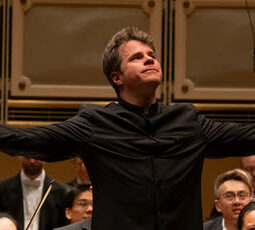
Commentary: If the lineup of Chicago Symphony guest conductors for next season looks like an audition roster for a prospective successor to Riccardo Muti as music director, one name stands out if only because it occurs twice: Jakub Hrůša, who will lead consecutive programs in March 2024. Based on the nuanced and illuminating Mahler Ninth Symphony he conducted with the CSO this past weekend, one might even see the 41-year-old Hrůša as frontrunner.
As Muti era spins toward close, he spotlights musicians who helped create an epic splendor

Commentary: Two consecutive weeks of concerts at Orchestra Hall, marking Riccardo Muti’s penultimate stint as music director before what figures to be quite a grand finale in June, amounted to something of an extended house party – just the man and his band in showcase concerts that spoke volumes about the mettle of the Chicago Symphony Orchestra and the 13 seasons of their creative togetherness.
When Yo-Yo Ma joins CSO for a concert, crowd goes wild; and then the scene gets really mad
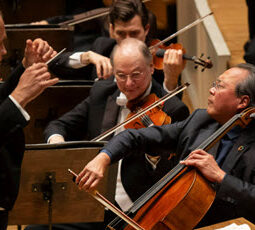
Review: All that was lacking was the Guinness and step-dancers to turn the Chicago Symphony Orchestra’s special concert with cellist Yo-Ya Ma into what the Irish call a hooley. it was a party, for sure, the May 1 event benefiting the musicians’ pension fund, and dancing in the aisles threatened to break out at any moment. There was a lot of whooping, and it began the moment the lionized cellist strode onto the stage at the concert’s outset to play the Elgar concerto. But that ovation paled in comparison with the near delirium that erupted in the packed house at the conclusion of Ma’s elegant performance led by Carlos Miguel Prieto.
Russian conductor takes up Shostakovich 8th, leading CSO deep into a complex spiritual web

Review: Dmitri Shostakovich’s epic and tumultuous Symphony No. 8 in C minor, composed in 1943, might be viewed as Volume 2 of his tomes of war, coming straight after the likewise sweeping and similarly fraught Symphony No. 7 in C major written the year before. One of Shostakovich’s most compelling works, elegantly wrought and spiritually complex, the Eighth Symphony received a sublime and penetrating performance April 27 by the Chicago Symphony Orchestra and Russian conductor Vladimir Jurowski.
French conductor Fabien Gabel, in CSO debut, makes subtly dazzling splash with Stravinsky

Review: If many in the audience at Orchestra Hall were unaware of French conductor Fabien Gabel when he made his debut April 20 with the Chicago Symphony Orchestra, they surely will remember him upon his presumably early return. The 47-year-old maestro’s fundamental musical elegance suggested that of CSO music director Riccardo Muti. On this first visit, Gabel’s leadership was fluent and efficient, the musical result eloquent, nuanced, brilliant.
As arts groups aim at winning audience back, CSO hits the target in back-to-back programs

Commentary: The emergent paradigm of inclusion, this new arts-wide acknowledgement of stage and concert hall as Everyperson’s forum and welcoming agora for all who wish to assemble there, was on manifest display in recent Chicago Symphony performances at Orchestra Hall. The repertoire showcased its fresh profile in brave new works or just unusual music by a broad range of composers, served up by a wide spectrum of artists. It was a mix highlighted by the CSO subscription debut March 23-26 of an elegant veteran, the African American conductor Thomas Wilkins.
‘Carmen’ at Lyric Opera: Love and death in old Seville, ups and downs in a muddled retelling

Review: Two warring concepts shape and drive Bizet’s opera “Carmen” – love and death. Or in French, l’amour and la mort, the one word formed as if entirely by the lips, the other resonating from somewhere deep in the back of the throat. Love, in the earthy and precarious world of the gypsy Carmen, is transitory, a placeholder, an article as disposable as life itself. But death, this thing that wells up from so deep a place in speech, is profound and inevitable, the single eternal verity. Both musically and dramatically, Lyric Opera of Chicago’s busy and vibrant “Carmen” wants the depth and darkness that mark this work as the prototype of verismo opera. ★★
As meteoric young conductor returns to CSO, young listeners roar promise at Orchestra Hall
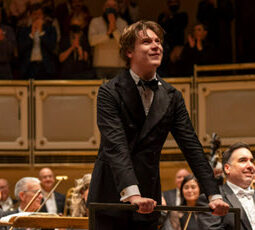
Review: The roof-raising roar spoke volumes about the Chicago Symphony Orchestra’s concert with the swiftly ascending young Finnish conductor Klaus Mäkelä on Feb. 16. In no small part, the stormy ovation that followed Mahler’s Fifth Symphony was just one more shockwave engendered by this phenomenal 27-year-old conductor wherever he goes. But the joyful noise was about other things, too.
Chicago Symphony to open Carnegie season
as Riccardo Muti era closes with long goodbye
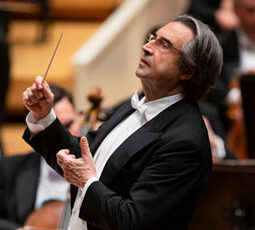
Report: The Chicago Symphony Orchestra will take the spotlight for the opening of Carnegie Hall’s 2023–24 season, with Riccardo Muti leading “a celebratory gala concert” on Oct. 4, the venerable New York institution announced. Muti, who steps down in June after 13 years as CSO music director, will also lead a second program the next night at Carnegie. The Carnegie opener features Tchaikovsky’s Violin Concerto with Leonidas Kavakos and Mussorgsky’s “Pictures at an Exhibition.” The second concert offers an Italian-themed program.
In dazzling debuts with Chicago Symphony, conductor and pianist renew Russian masters
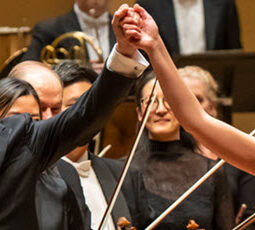
Review: Before an exuberant and youthful crowd at Orchestra Hall, the 34-year-old Israeli guest conductor Lahav Shani and the 30-year-old Italian pianist Beatrice Rana, enormous talents, made eclectic – and electric – Chicago Symphony Orchestra debuts.
Barber of Chicago: ‘The Factotum’ reimagines Mozart and Rossini in Black community opera
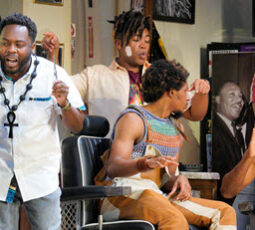
Review: There’s never a time when producers and directors of new shows fail to think, in the final days before opening, “We could really use another month.” But there’s also no denying the tantalizing potential of a new hit on brew at the Harris Theater, where the Lyric Opera of Chicago has unveiled a first look at “The Factotum.” ★★★★
Two masterly maestros meet some crazy kids: ‘Hansel and Gretel,’ ‘Albert Herring’ on stage
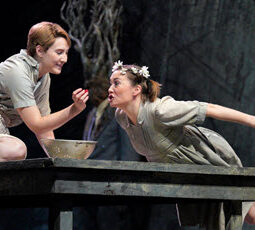
Review: What might a couple of poor kids lost in the woods and a shy, sheltered lad in the city have in common? The answer, played out in a romp through Humperdinck’s “Hansel and Gretel” at Lyric Opera of Chicago and a gentle, delightful go at Britten’s “Albert Herring” at Chicago Opera Theatre, is – spunk!
Lyric Opera’s bright and funny ‘Le Comte Ory’ confirmed the company’s return to full vigor
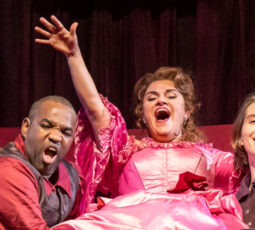
Commentary: No Chicago arts presenter deserves the success of its current season more than Lyric Opera, which in March of 2020 was forced, by the onset of Covid, to cancel its “Ring” cycle, a gargantuan undertaking involving Richard Wagner’s four-chapter mythical saga. The company capped its autumn offering with a dazzling go at Rossini’s comedy, in Bartlett Sher’s Metropolitan Opera production, designed by Michael Yeargan and revived here by Kathleen Smith Belcher.
Verdi’s ‘Don Carlos’ at Lyric Opera of Chicago: Epic French version is potent despite stark set
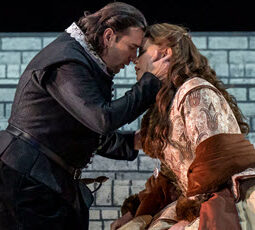
Review: The fascinating problem with the Lyric Opera production of Verdi’s “Don Carlos” – beautifully conducted by music director Enrique Mazzola, especially in the mystical, delicate parts – is that there is almost too much of it. A Thanksgiving feast comes to mind, that overwhelmed sense that can develop before the third helpings are passed and desserts loom. The fifth and final act ends, as it must, in defeat and death, with Verdi’s music at its most painfully exquisite.★★★★
Post-pandemic, CSO playing at familiar peak, but audiences have thinned at Orchestra Hall
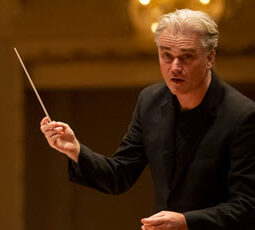
Commentary: October ended and November began with a sizable qualitative swing in concerts by the Chicago Symphony at Orchestra Hall. What was constant, and troubling, was the sea of empty red seats. Even going back to the beginning of October, when music director Riccardo Muti was on the podium, the house looked light – something that would have been unimaginable pre-pandemic.
Chicago Shakespeare: Solving the ‘problem,’ but creating others, in ‘Measure for Measure’
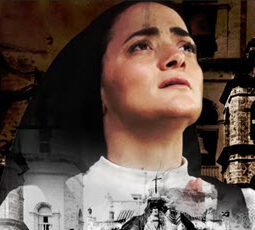
Review: CST’s aggressively distilled “Measure for Measure” is a light version that brings to mind the Metropolitan Opera’s condensed, English-language version of Mozart’s “The Magic Flute,” readily consumable by the whole family. (Not here, though.) In the case of “Measure for Measure,” there’s an argument for boiling it down to essential lines and action. This treatment directed by Henry Godinez skips along at a good clip, extracting lively theater from a rather ponderous “lesson” text. ★★★
As speculation on Muti’s successor ramps up, rumor mill offers a spin: He may not be leaving
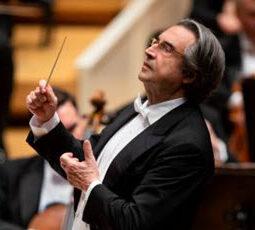
Commentary: Riccardo Muti’s nominal final season as music director of the Chicago Symphony Orchestra commenced with a dazzling first wave of concerts capped by the announcement of an extensive North American tour in January. Then, no sooner had Muti wrapped up his first three weeks at Orchestra Hall than the British website Slipped Disc posted a hot rumor that Muti isn’t going anywhere after all – that the CSO intends to title him music director emeritus and that he will have a significant presence in Chicago for the 2023-24 season. The CSO’s comment, in essence: Stay tuned.
After a dozen years, impact of Riccardo Muti
on CSO can be heard in large ways and small

Review: An account of the Chicago Symphony Orchestra’s concert Sept. 29 with music director Riccardo Muti could begin at any point in the program of works by Rossini, Mozart and Prokofiev – and the gist would be the same. Whether heard as a display of musical elegance, style and wit or as an exercise in sheer sonorous splendor, the whole effect, front to back, was spectacular. No soloist. None needed. The purely orchestral exhibition spoke volumes about why this orchestra led by this conductor is very special.
Sharing stage time in Lyric’s early autumn: Vocally splendid Verdi and a fresh ‘Fiddler’
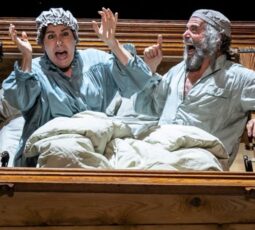
Review: Giuseppe Verdi’s 1844 opera “Ernani” could hardly be conducted, directed or sung more beautifully than it is at Lyric Opera of Chicago, where a quartet of lead singers make some all but impossible scenarios ring true under the leadership of music director Enrique Mazzola and theatrical director Louisa Muller. The opera classic has been sharing the Lyric stage with the musical “Fiddler on the Roof” in a riveting directorial treatment by the Australian Barrie Kosky, whose “Fiddler” puts the 19th-century story in a 21st-century envelope. Both shows: ★★★★
Muti’s crowning year as CSO music director begins with a flourish, and more is just ahead
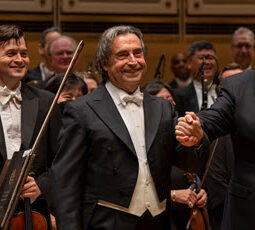
Review: The Chicago Symphony Orchestra opened its 2022-23 season, Riccardo Muti’s last as music director, collaborating with pianist Yefim Bronfman in Brahms’ Piano Concerto No. 1 in D minor. Allowing that a “definitive” account doesn’t exist in the universe of the performing arts, we surely might hedge with the word consummate in describing the musicianship, poetics and interpretative authority on display in that splendid and riveting performance.
At Cliburn competition finals, blazing talent
ruled as world politics hovered in the wings

Report: Mid-June heat was on in the entire middle third of the country, all the way from Chicago, where temperatures hit the upper 90s, to Fort Worth, Tex., which saw daytime highs in the triple digits. The heat was on in Fort Worth’s Bass Performance Hall as well, as 30 pianists from around the world competed at the 16th quadrennial Van Cliburn International Piano Competition. It all came down to the intense drama of six finalists vying for the gold medal: two Russians (neither currently living in their home country) and a Ukrainian, as well as one apiece from the U.S., Belarus and South Korea.
Haymarket Opera lifts the veil from Bologne’s ‘L’Amant anonyme’ to reveal a comedic gem
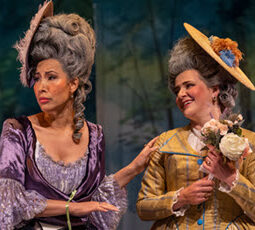
Review: Haymarket Opera Company’s delightful production of Joseph Bologne’s “L’Amant anonyme,” in the perfectly proportioned Jarvis Opera Hall that has become its new home at DePaul University, brought to mind a night at the jewel-box opera at Versailles, outside Paris. Not so ornate as Versailles perhaps, no cozy little boxes from which to view the proceedings. But I suspect Bologne would have relished revisiting this 18th-century comedy – and hearing it sung, and spoken, in such excellent French that he might have thought himself transported back to that time and place. ★★★★
With Muti sidelined, young conductor steps up to lead Chicago Symphony in Brahms triumph
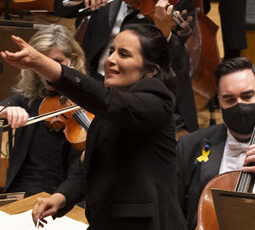
Review: Like the invited guests at the Chicago Symphony Orchestra’s open morning rehearsal on June 16, Lina González-Granados took a seat at Orchestra Hall to watch CSO music director Riccardo Muti lead the troops through Brahms’ Symphony No. 1 in C minor. After a break, the orchestra would be joined onstage by violinist Anne-Sophie Mutter, one of the most celebrated musicians in the world, for a run-through of the Beethoven Violin Concerto, the other work on that evening’s concert program, with Muti on the podium. But that’s not exactly what happened. Muti had tested positive for Covid and was done for the day. González-Granados, his resident conducting apprentice, sprang into action, taking over the rehearsal and scoring an impressive success in the evening concert.
Muti tests positive, cancels CSO concerts; apprentice maestro steps in to lead program
![Muti tests positive, cancels CSO concerts; apprentice maestro steps in to lead program Lina Gonzalez Granados_feature img Todd Rosenberg[8103]](https://chicagoontheaisle.com/wp-content/uploads/2022/06/Lina-Gonzalez-Granados_feature-img-Todd-Rosenberg8103-255x230.jpg)
Report: Riccardo Muti, music director of the Chicago Symphony Orchestra, has tested positive for Covid-19 and has canceled his scheduled concerts with the orchestra June 16-18 at Orchestra Hall, the CSO announced. Stepping in for Muti will be the Chicago Symphony’s Sir Georg Solti conducting apprentice, Lina González-Granados, who will lead the originally scheduled program of Brahms’ Symphony No. 1 and the Beethoven Violin Concerto with soloist Anne-Sophie Mutter.
With her Third String Quartet, Amy Wurtz sees extension of legacy of Beethoven and Bartók
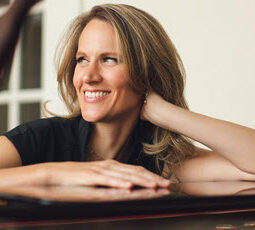
Preview: In 2014, the Chicago-based American Music Project (AMP) launched a new program to periodically showcase all-but-forgotten gems by American composers of the 20th and 21st centuries, and to commission new musical works, as well. After a Covid-induced hiatus, the Project will relaunch June 5 at Ganz Hall with a concert by the Chicago-based Kontras Quartet in a wild mix of music by composers old and new. The agenda includes a world premiere by Chicago composer and pianist Amy Wurtz, whose String Quartet No. 3 is the Project’s latest commission.
Theater for two: Kids in search of themselves, and a pop-up polemic that goes off the rails
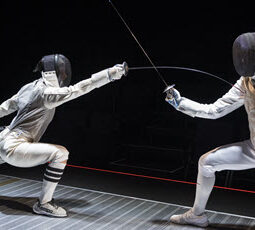
Reviews: Plays for two actors, known in the theater world as two-handers, make special and perhaps obvious demands on the players, the director and certainly the playwright. Placing the whole burden of a play’s instigation, elaboration and denouement on two speakers is to set a high bar for success, as demonstrated by Gracie Gardner’s “Athena” at Writers Theater and Lloyd Suh’s “The Chinese Lady” at TimeLine Theatre. The former stumbles when it abandons language for physicality; the latter veers from charm and wit into polemic, wit driven out by cant. “Athena” ★★ “The Chinese Lady” ★★
Fresh feathering of Chekhov’s ‘Seagull’ turns debut of Steppenwolf space into mottled affair
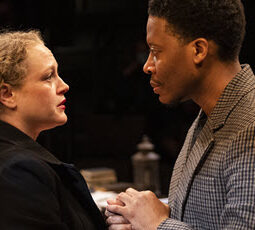
Review: There has been a steady stream of English renderings of “The Seagull” since the comedy – Chekhov’s own term – first saw light in 1896. Now Steppenwolf Theatre adds to that catalog with an adaptation created by ensemble member Yasen Peyankov, the opening flourish for the company’s splendid new in-the-round Ensemble Theater in its grand new building next door to the old one on North Halsted. I came away from this “Seagull” – Peyankov has dropped “The” – with mixed impressions from every perspective. ★★
Recent Posts
- Jakub Hrůša’s rare moment at Orchestra Hall captured Chicago Symphony’s bright outlook
- Shape-shifting Civitas Ensemble, as foursome, reveals buried gem in music of French woman
- Nearly 70 years in, Chicago Symphony Chorus gives grand first airing of Haydn C major Mass
- Amid new CSO season’s glittering prospects, concert highlights are mined by the scoopful
- In stellar concert with Finnish conductor, CSO extends an impressive string of performances
Most Commented
- Role Playing: Janet Ulrich Brooks on nailing the style of a wily Russian in 'A Walk in the Woods'
- Role Playing: City boy Michael Stegall ropes wild cowboy in Raven Theatre’s ‘Bus Stop’
- Role Playing: Sadieh Rifai zips among seven characters in one-woman ‘Amish Project’
- Role Playing: Kirsten Fitzgerald inhabits sorrow, surfs the laughs in ‘Clybourne Park’
- Role Playing: Brent Barrett’s glad he joined ‘Follies’ as that womanizing, empty cad Ben

